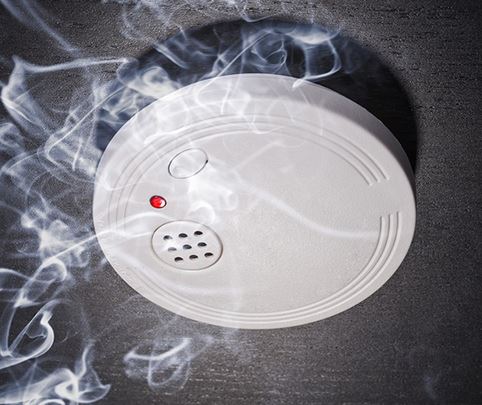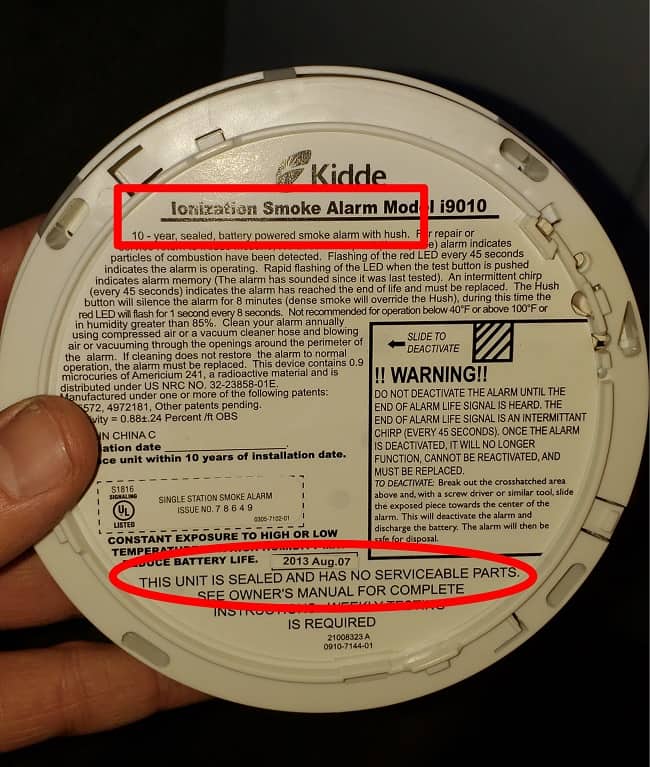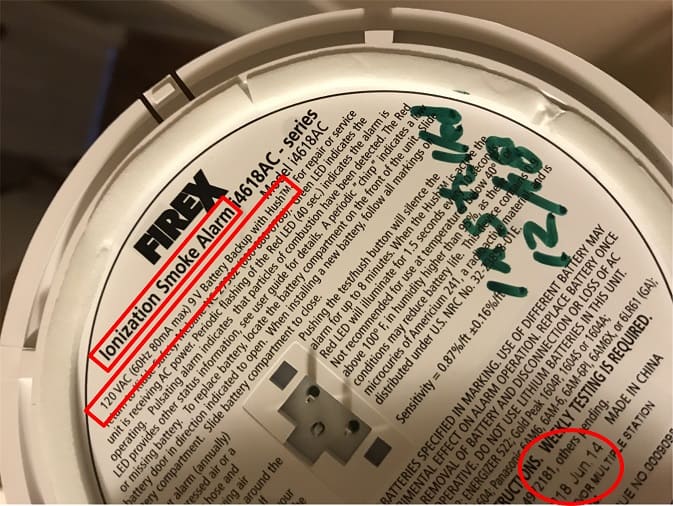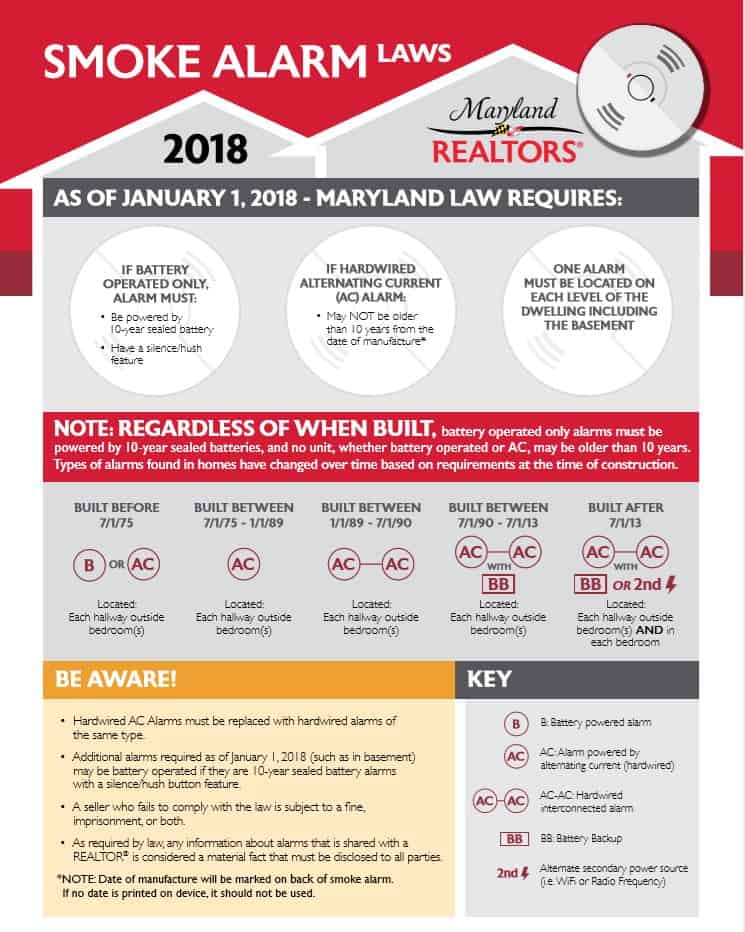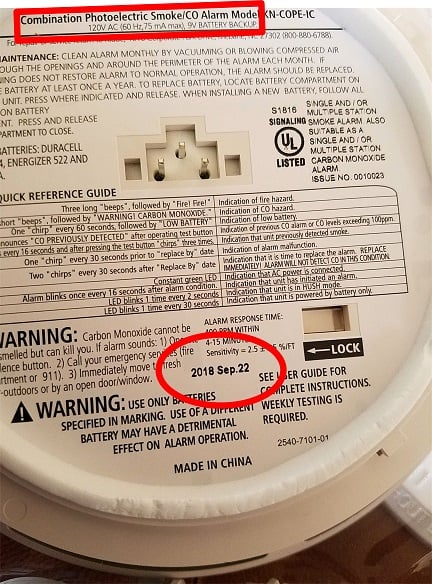I know, I know – Daylight Savings time is this weekend, March 10, 2019 at 2:00am and, let me guess, you’re tired of hearing the same old cliché, “Change the batteries in your smoke detectors”, right? Well, perhaps I have some good news for some of you that live here in Maryland! With the current Maryland smoke detector law that had a deadline of January 1, 2018 for compliance (it was passed in 2013) and depending on when your home was built, some Maryland residents might not have to change batteries in smoke detectors anymore! For the rest of us, don’t worry – they are not getting off that easy as you will find out further in this article. In all seriousness, however, EVERYONE SHOULD TAKE FIRE SAFETY VERY SERIOUSLY as it can literally be the difference between life and death!
Maryland Smoke Alarm Law Changes You Say?
That’s right – Maryland passed a law in 2013 AFFECTING EVERY HOME IN MARYLAND (regardless of age of home) and required that this law be complied with by January 1, 2018. As a licensed Maryland Home Inspector, I take my job seriously, especially when it comes to people’s safety. As a husband and father of 3 children, one of whom is a local Firefighter and Emergency Medical Technician (EMT) and soon-to-be Paramedic, you had better believe I take Fire Safety VERY SERIOUSLY. I can personally tell you from experience that I find A LOT of homes in Maryland are still not in compliance with the 2013 Smoke Alarm law. I have to believe the majority of people here in Maryland are just plain unaware of this Smoke Alarm law – I know myself that I was unaware of the law until studying to become a Home Inspector. I am hopeful that someone comes across this article and realizes that their home may need some new smoke alarms and that it might just save someone’s life one day.
So, what does this law require? The proverbial “it depends…” answer applies here, unfortunately. Don’t worry, it’s really not that bad – I will try to simplify it for you here.
Homes Built Before July 1, 1975
If your Maryland home was built before 7/1/75, here’s what you need for smoke detectors in your home:
- One alarm must be located on EACH LEVEL of the dwelling INCLUDING the BASEMENT
- Alarms can be either DC-powered (Battery-only) or AC-powered (hard-wired) or AC-powered with DC-powered backup (hard-wired with battery backup)
- If the alarm is DC-powered (Battery-only), it has to have a 10-year sealed battery and a slience/hush feature and the unit cannot be older than 10 years from date of manufacture
- If the alarm is AC-powered (hard-wired) or AC-powered with DC-powered backup (hard-wired with battery backup), the unit cannot be older than 10 years from date of manufacture
Example of a 10-year Sealed DC-powered Battery-only Smoke Alarm – be sure to check the Manufacture Date and Replace if older than 10 years
Homes Built Between July 1, 1975 and January 1, 1989
If your Maryland home was built between 7/1/75 and 1/1/89, here’s what you need for smoke detectors in your home:
- One alarm must be located on EACH LEVEL of the dwelling INCLUDING the BASEMENT
- One alarm must located in each hallway outside bedroom(s)
- Alarms must be AC-powered (hard-wired) or optionally can be AC-powered with DC-powered backup (hard-wired with battery backup)
- The alarm cannot be older than 10 years from date of manufacture
Homes Built Between January 1, 1989 and July 1, 1990
If your Maryland home was built between 1/1/89 and 7/1/90, here’s what you need for smoke detectors in your home:
- One alarm must be located on EACH LEVEL of the dwelling INCLUDING the BASEMENT
- One alarm must located in each hallway outside bedroom(s)
- Alarms must be AC-powered (hard-wired) or optionally can be AC-powered with DC-powered backup (hard-wired with battery backup)
- Alarms must be interconnected (if one alarm sounds, they all sound)
- The alarm cannot be older than 10 years from date of manufacture
Homes Built Between July 1, 1990 and July 1, 2013
If your Maryland home was built between 7/1/90 and 7/1/13, here’s what you need for smoke detectors in your home:
- One alarm must be located on EACH LEVEL of the dwelling INCLUDING the BASEMENT
- One alarm must located in each hallway outside bedroom(s)
- Alarms must be AC-powered with DC-powered backup (hard-wired with battery backup)
- Alarms must be interconnected (if one alarm sounds, they all sound)
- The alarm cannot be older than 10 years from date of manufacture
Homes Built After July 1, 2013
If your Maryland home was built after 7/1/13, here’s what you need for smoke detectors in your home:
- One alarm must be located on EACH LEVEL of the dwelling INCLUDING the BASEMENT
- One alarm must located in each hallway outside bedroom(s)
- One alarm must located inside each bedroom
- Alarms must be AC-powered with DC-powered backup or other alternate power source (hard-wired with battery backup or other power source)
- Alarms must be interconnected (if one alarm sounds, they all sound)
- The alarm cannot be older than 10 years from date of manufacture
Example of a AC-powered with Battery-backup Smoke Alarm – be sure to check the Manufacture Date and Replace if older than 10 years
Clocks Change, Check Your Alarms!
Each year for decades now you have heard “Clocks change, change your smoke alarm batteries!” With the present law, this still applies, but we need to take it one step further and do more than check/change our smoke detector batteries – we need to check all of our smoke alarms to be sure they are of the proper type (see previous sections for required types) and are not expired.
First, if you have a home built before 7/1/75 and it has any battery-only powered smoke alarms that use 9V or AA or any other type of removable battery (including Lithium Ion removable batteries), take them down and recycle them because they now must be replaced. I always recommend trying to update all of your smoke detectors with the most modern type and installing additional detectors to comply with modern safety codes. However, if you cannot replace your alarm with a modern interconnected AC-powered with DC-powered backup (hard-wired with battery backup) detector, then you must at a minimum replace it with a detector that has at least a 10-year sealed/non-replaceable battery and a slience/hush feature. A 10-year sealed/non-replaceable battery prevents someone from removing the battery and forgetting to reinstall the battery later.
For the rest of you with homes built after July 1, 1975, please see the previous sections in this article to determine the requirements for the type and placement for your smoke detectors. All homes built after 7/1/75 in Maryland were required to have AC-powered (hard-wired) detectors, but depending on exactly when your home was built, you may or may not have batteries to check and/or replace in your detectors. Regardless of whether your detectors have battery backups or not, you need to check them for the date of manufacture and REPLACE IF OLDER THAN 10 YEARS. Most manufacture dates are printed on the backside of the detector, but if you cannot determine the date, err to the side of caution and replace it to be safe, especially if it has yellowed in color as this usually happens to detectors that have been installed a decade or more.
For those with homes built after July 1, 1989, your detectors were required to be
AC-powered (hard-wired) AND interconnected. You need to check each one for the date of manufacture and REPLACE IF OLDER THAN 10 YEARS. However, you cannot just replace an expired detector with just any detector in your situation because of the Interconnection feature. You will need to install a replacement detector that is compatible with ALL of the interconnected detectors in the home to be sure that the system works properly so that if one alarm sounds, they all sound. You will need to check with the Alarm Manufacturer to determine compatibility. However, chances are if you have one smoke detector that is expired, the rest are probably expired or about to expire as well. Make it easy on yourself and replace them all with new units of the same manufacturer and type (or compatible models).
For those with homes built after July 1, 1990, your detectors were required to be AC-powered with DC-powered backup (hard-wired with battery backup) AND interconnected. Here again, you need to check each one for the date of manufacture and REPLACE IF OLDER THAN 10 YEARS. As discussed above, because of the interconnection feature, you must be sure any replacement detector(s) is compatible with ALL of the interconnected detectors in the home to be sure that the system works properly so that if one alarm sounds, they all sound. Because of the battery backup requirement, the old “Clocks change, change your smoke alarm batteries!” reminder still applies to you. The good news is the battery-backups are still the easy 9V or AA types for the most part and are cheap and easy to replace. Just be sure you do because you will want to make sure they work in the event of a power outage and a fire occurs.
Carbon Monoxide Alarms
Your local jurisdiction may or may not require you to have Carbon Monoxide (CO) alarms in your home. If you are renting your home, be sure to check with your County/Municipality because some now require CO detectors in rental units by law. Regardless, if you have any carbon-based fuel-burning appliances in your home (gas, propane, wood, pellet, etc.), I recommend you install a CO detector in a central location on each level of your home (including basements) for added safety for you and your home’s occupants. If you are replacing expired smoke detectors, you may want to consider a combination Smoke/CO alarm instead of just a Smoke-only alarm. Be sure if your Smoke detectors are interconnected that the Smoke/CO alarm(s) are compatible with all your detectors (see Manufacturer for compatibility).
Example of a AC-powered with Battery-backup combination Smoke/CO Alarm – be sure to check the Manufacture Date and Replace if older than 10 years
Summary
As home inspectors, we regularly impress upon our clients that smoke alarm system maintenance is absolutely necessary for the safety of the home’s occupants and it is, of course, one of the many things we check when performing a Maryland Home Inspection. Clock changes with Daylight Savings Time are still a great opportunity for us to remember to do this important task. Smoke alarms (and CO alarms) are something that we take for granted are going to be there and work when we need them. However, expired alarms and alarms with dead or removed batteries are not going to save any lives! Although you may initially have thought that the current Maryland Smoke Alarm Law is just another inconvenience, I hope after reading this article you realize that it exists to SAVE LIVES and I hope you take it seriously and comply with it fully for you and your family’s well being. Feel free to contact me with any questions you may have regarding this article.
Call Absolute Assurance at 443-939-HOME (4663) for all of your Home Inspection needs including full and partial home inspections for buyers/sellers/investors, rental inspections, annual home inspections, mold inspection and testing, radon testing, and water testing!

